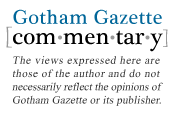Making Joel Klein Behave
When I was an assistant principal a teacher often would send a kid into my office when he was misbehaving. I'd threaten to bring his mother up to school, and he'd promise not to be "bad" anymore.
For six years the Joel Klein administration at the Department of Education has been promising not to be "bad" anymore.
Last November a constituent came into my community office. Her son had a disability and had been in special ed classes his whole school career. When he started high school, he was not put into a Special Education class. So, he was failing all his classes and getting into increasing difficulties. When she complained to the school she was told there was "no room in the special ed classes." She called the city's "311" non-emergency hotline and was told the same thing.
After three decades as a teacher and assistant principal, I knew who to call -- and did -- and the school reluctantly placed the student in the correct class.
Another parent applied to the new small schools housed in what had previously been a large high school across the street from her home, but her child wasn't accepted to any of the schools. "Too bad," said the department. "You can appeal, but we rarely uphold appeals, and, it's only a 45-minute bus ride to the assigned school.'
When my colleague, Linda Rosenthal, who represents the Upper West Side of Manhattan, asked a Klein staffer why the department failed to plan for the sharp increase in kids entering school, the staffer went on and on about demographic studies. Linda responded, "Why didn't you count baby strollers?"
These incidents, and other like them, point to an overall problem with the city's running of its school system.
As a member of the State Assembly, serving on the Education Committee, I should be able to communicate with appropriate department officials in regard to department polices, information, school data -- the information necessary to formulate legislation. My experience has been that the department dissembles, ignores and marginalizes parents; it has been with a department that is simply arrogant. Attempts to get information about schools in our district are shunted to the press office.
The current system isn't working. Klein keeps promising not to be "bad," without changing any behavior. It's time for the legislature to impose changes.
Fixing the Problems
While some of my colleagues call for allowing mayoral control to expire, I believe the mayor should retain control, but with significant changes to the law.
-- Members of the Panel for Educational Policy, a.k.a the central board, should be appointed after vetting by a screening mechanism, similar to how local bar associations screen judicial candidates. They should then be selected by the mayor, borough presidents, the public advocate and the speaker of the City Council. The mayor should appoint five members of the panel for fixed terms, and every borough president and the City Council speaker should each appoint one member. The mayor also should name the chancellor.
-- An independent organization with subpoena powers should be formed. It should release regular reports on student achievement and fiscal data, and be jointly led by the state commissioner of education and the state comptroller. All Department of Education student data, with appropriate protection to ensure confidentiality, should be available to the public for research purposes.
-- Community and high school superintendents should actively monitor student progress, meet regularly with parents and community representatives and supervise all school staff under their purview.
-- Community Education Councils, a.k.a. Community School Boards, should participate in the selection of superintendents and principals. They should evaluate the performance of the superintendents and make recommendations to the chancellor. They also should be consulted in a timely manner on all zoning issues such as the opening and closing of all schools, including charter schools. Each district should maintain a District Leadership Team that complies with state Department of Education regulations. School and district leadership teams should be able to appeal decisions of the chancellor to the state commissioner of education, who would then resolve complaints in an expedited fashion.
While the chancellor likes to call the former Community School Board system a "failed system," he is incorrect. Some schools districts were models of parent and community involvement with superb student achievement while others were dismal failures.
-- An independent Office of Parent and Community Advocacy should be created to resolve parent issues and complaints, train parent school leaders and act as a liaison with community organizations.
It is time to change the law, to remind the mayor and the chancellor that children and families are not widgets. The system must both respond to them and involve them so that Klein can finally uphold his promise not to be "bad" anymore.
Alan Maisel, a former schoolteacher and assistant principal, is a Democratic member of the State Assembly, representing District 59 in Brooklyn.
The Limits of Democracy
The vote in Albany deciding whether or not to reauthorize the law giving the mayor control of New York City's public schools is approaching quickly. A vociferous effort by defenders of the old system has recently dampened the support for keeping the power in the mayor's hands.
Opponents of reauthorization -- including the teachers' union and many Bloomberg administration critics -- have won the most ground with their argument that mayoral control is undemocratic. But there is a difference between a democratic political system and a democratically run bureaucracy. New Yorkers shouldn't let such arguments persuade them to return to the bad old days, when no one was responsible for the city's schools.
The Bad Old Days
The old system of an appointed, unaccountable Board of Education bred a culture of inaction and crippled Gotham's schools. Though opponents of reauthorization say that they don't want to go back to that exact system, for all practical purposes their proposed "tweaks" to the law would do that.
Mayoral control broke the stagnation produced by an unaccountable system. While some may still disagree with Mayor Michael Bloomberg's specific reforms, there is little doubt that mayoral control has been essential in moving education reforms forward.
Despite the allegations of those opposed to reauthorization of the current law, there is nothing inherently undemocratic about the mayor controlling a large city bureaucracy like the school system. After all, the mayor controls other city services -- police, fire, sanitation and others -- with little complaint that his power is dictatorial. Of course, public schools have a uniquely democratic purpose in providing children with the knowledge they need to be effective and productive citizens. But that hardly means that day-to-day school operations must be governed democratically.
As in other policy areas, democracy's role in education is to put in place representatives who reflect the will of the people and hold those policymakers accountable for their cumulative decisions. Relying on such democratic processes to decide each individual policy is impractical and only leads to the stagnation and the poor results of Gotham's past.
The Parents' Part
Mayoral control does nothing to deny parents their essential role in education. Parents are in the best position to know what is best for their individual child. But, as with other government agencies on which we rely, the mayor is in the best position to make decisions that affect the broader education system.
That said, parents and communities do have a large stake in schools, and they should be consulted about important policies. But the mayor couldn't avoid communicating with them even if he wanted to. Those opposed to his school policies aren't exactly silent. Dissenting voices have spoken out against just about every policy the Bloomberg administration has pursued. While the mayor has the final word, he pays a political price when he goes against the true will of the people, and doing so takes a toll not only at the voting booth but in his ability to govern. Just because those opposed to recent reforms often have not gotten their way does not mean that they did not participate in the governing process.
Gotham's $18 billion school system, which operates more than 1,400 public schools, is a complex bureaucracy that requires a decision-making entity -- namely, the mayor. Mayoral control should be renewed.

Marcus Winters is a senior fellow at the Manhattan Institute.
Beyond Governance -- Creating a Constitution for City Schools
State Education Department Chancellor Merryl Tisch has added her voice to that of prominent education historian Diane Ravitch in challenging whether mayoral control of New York City schools has accounted for any improvements in student performance over the past several years or, indeed, whether significant improvement actually has occurred. The jump in test scores across New York State, with Buffalo registering a gain one third again greater than that claimed for New York City, has led Tisch to want to investigate whether "the tests have been made easier." Other experts have challenged official assertions of high school graduation rates.
Nearly all analysts -- from government officials, such as the public advocate, city comptroller and members of the City Council, to those who work in the schools (including members of the teachers union, the principals union and DC37) ---- as well as most major public school parent representatives -- have decried the lack of transparency, objective assessment and considerations of alternative policy ideas that have characterized the Department of Education, under the dictates of Mayor Michael Bloomberg and Chancellor Joel Klein.
Limiting Absolute Authority
Our society values democratic procedures because we recognize that no one has a monopoly on wisdom and that giving leaders unlimited power can have dire consequences. We have just lived through the debacle created by self-considered know-it-alls who brought us the deception associated with the war in Iraq, and with the AIG/Bear Stearns/Lehman Bros/Citibank accounting by Moody's and Standard & Poor's. Surely the lesson is that independent oversight, accompanied by additional sources of information and decision-making, are essential.
This is why the focus on the future of school governance is necessary. The current system offers no real accountability. After all, the opportunity to make change comes only once every four years by an electorate in which direct stakeholders -- children, parents and educators -- are vastly outnumbered by those not affected by the schools day to day. The majority of voters, therefore, will rely on issues other than the condition of schools to determine whether to re-elect a mayor.
The Limits of Governance
But while focus on governance is necessary, it is insufficient. There is no guarantee that any different structure will articulate the vision and implement the policies that will provide the kind of education many of us seek for all New York City students.
For the past 40 years, during which I have observed and participated in efforts to improve New York City schools, there have been centralized systems, various forms of decentralization and now recentralization. There have been chancellors who have been educators and those who have not.
Amid all this change, there has been one constant. Regardless of the system of governance or who was chancellor, the schools have failed the majority of students, primarily low-income children of color.
Accountability, transparency and structure matter -- but only if they exist to uphold and advance shared principals and goals. This is what has been missing in New York City.
Schools have had Comprehensive Education Plans, so have districts. But the system as a whole has lacked such a comprehensive education plan. The administration's Children First initiative hardly qualifies. It, and the recent district and school plans which flow from it, is a No Child Left Behind compliance document, filled with data about test scores, but nary a sentence about what qualities define an educated person. It lacks any mention of initiatives that will inculcate critical thinking, creative imagination, love of learning, scientific literacy and preparation for democratic citizenry.
In my District 6, 12 out of 13 middle schools received report card grades of A or B, yet only 30 percent of eighth graders met New York State standards in science, and only 16 percent do so in social studies. So what does any purported increase in reading or math scores reveal about whether we are educating children?
Setting Goals...
What is needed, therefore, is an explicit and legally binding articulation of purpose stating what we want to accomplish in our schools. This statement needs to be embodied in a Constitution for the New York City Public School System. Such a constitution can set out the vision and the mandates necessary to provide all our city's children with a truly comprehensive public democratic education regardless of who governs the system or how it is governed.
The model is that of the victory of the Campaign For Fiscal Equity, which challenged the funding of education in New York State. That lawsuit was possible only because the New York State Constitution guarantees the right to a "sound, basic, education." Citing that language, the campaign argued the level of funding for city schools was not adequate to provide such an education. Now, though, it is time to go beyond that framework to require the conditions to produce educational excellence for all.
The Parent Commission on School Governance, of which I am a contributor, has drafted a sample constitution illustrating what such mandates could include.
Some would involve resources. The schools might need to have, for example, sufficient trained instructional and support staff to reduce class size to the level recommended by the Professional Judgment Panels in the CFE case. In addition, the city and state would have to provide every school with the facilities that a comprehensive curriculum requires, such as science labs, art rooms, gymnasiums and auditoriums.
Other would concern educational philosophy. Steps would be taken to ensure the use of multiple forms of assessment -- not just standardized tests -- such as including rigorous individualized student projects, as the 28 schools in the New York Performance Consortium do, with excellent student outcomes. The constitution could require developing a staff sensitive to the diversity of ethnicity, race and class in the system and that reflects the demography of the students of the city. The constitution could stress the educational value of schools and classrooms that are racially and economically integrated.
Additional mandates could enshrine schools as collaborators with their communities offering universal pre-kindergarten and, along with other institutions, providing comprehensive healthcare, after-school recreation and adult education.
Such a constitution would codify in law what our schools have never had: a shared mission with core principles, primary goals and a policy framework that must be respected and upheld by whomever is governing the system.
... And Sticking to Them
At the beginning of every school year, the Board of Education and chancellor would set out how they plan to achieve these goals. They also would evaluate whether the board's policies are furthering the fulfillment of the mandates. That would be the beginning of real accountability of the Board of Education. Any non-compliant board would be subject to review by the State Education Department and ultimately could be removed from office through procedures set out in the constitution.
The board and chancellor also would provide an honest assessment of how much it would cost to fulfill the aims set forth in the constitution, even if that funding was not available. This would help determine what the level of education funding should be.
An Opportunity for Change
The Parent Commission has a governance proposal that it hopes the state Legislature will adopt. It includes a major role for parents together with a diminution of the mayor's power; restoration of district superintendents and offices; and greater attentiveness to students with special needs. Such measures can begin to change the educational environment.
Simultaneously, however, the legislature should seize this historic opportunity as we re-examine our school system and establish a broad-based task force or commission, composed of parents, educators, community based organizations, business and religious groups, to forge a citywide consensus on what would emerge as a constitution for our schools. Together with an organization called the Rs Coalition, we are drafting legislation that would incorporate this proposal.
Without articulation of an educational vision -- and a procedure for requiring that that vision be realized -- the schools will continue to fail many of our students. Then, when the next experiment with a governance system runs its course, we likely will once again have the same discussion we are having now about why students are unprepared for employment or citizenship.
That would be a tragedy for the families who have been denied for so long. It also would be tragic for our city.

Josh Karan has been engaged in efforts to establish democratic educational excellence for 35 years. He has been a community organizer in District 19 in East New York Brooklyn, an active supported of the Campaign For Fiscal Equity, and a member of the District 6 Community Education Council and the Parent Commission on School Governance and Mayoral Control.






